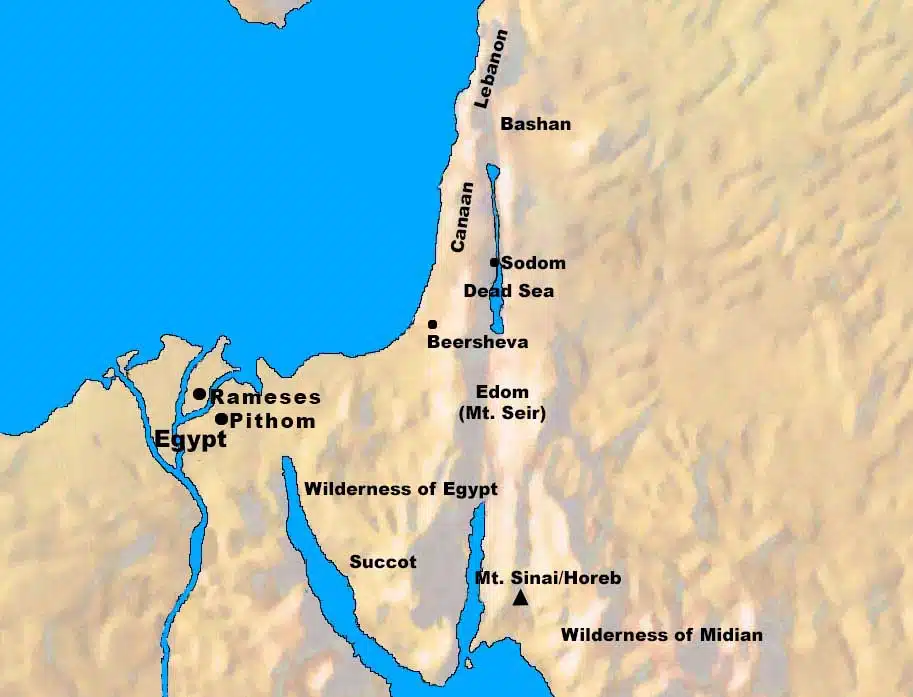The elders of Israel are called to come before the LORD for worship. Moses recounts the LORD’s ordinances to the people, who repeat their promise to obey.
In the first part of the ratification ceremony, the leaders of Israel are called into the LORD’s presence. The LORD said to Moses, “Come up to the Lord, you and Aaron, Nadab and Abihu and seventy of the elders of Israel, and you shall worship at a distance. In chapter 19, Moses went up the mountain alone. Here, he was accompanied by Aaron his brother, Aaron’s two oldest sons Nadab and Abihu, and seventy of the elders (leaders) of Israel. In Exodus 18, Moses had appointed a chain of leadership to resolve disputes and judge the people. This group of seventy of the elders would presumably represent the top leaders in that group, and be sufficiently broad to fully represent the people.
Though this group will go up the mountain, only Moses alone, however, shall come near to the Lord. Moses was the mediator between the LORD and the people, so he was the only one allowed to come near to the LORD. Aaron, his sons, and seventy of the elders were all to come up on the mountain, but not come near to God, only to worship from a distance. Further emphasis was added, nor shall the people come up with him. The people were to stay at the bottom of the mountain.
The phrase worship at a distance can also be translated “bow down” as in Genesis 19:1. Submitting to God can take many forms, including acknowledging Him in service by walking in obedience to His commands (Romans 12:1). The leaders’ act of worshipping at a distance likely includes observing God’s command to come up the mountain then remain at a distance, in obedience to God’s instructions.
Verse 3 appears to start after the party that ascended the mountain returned and appeared before the people. It begins with a ratification of the covenant by the people. To begin with, Moses came and recounted to the people all the words of the Lord and all the ordinances. This was not the first time they had heard these words of the LORD. They heard a short version in Exodus 19:3–7 where the LORD promised to make them a “kingdom of priests and a holy nation” if they obeyed Him (19:5 – 6). In Exodus 19:8, the people agreed to obey the LORD, and they did the same thing here, for all the people answered with one voice and said, “All the words which the Lord has spoken we will do!”
Here, what they promised to do included the laws found in Exodus 20:22 – 23:33. At this point, both parties have agreed with the stipulations of the covenant. To formalize the agreement, Moses wrote down all the words of the Lord. It is important to note that the people agreed to obey all the words which the LORD spoke to them. This included the LORD’s warnings that the people would experience discipline for disobedience to His commands. They heard the proposed terms, and agreed that the opportunity for blessing was worth the condition of obedience.
Now that the people had heard the stipulations of the covenant and agreed to obey them, it was time for the covenant to be formalized in a ceremony. This was common practice in the Ancient Near East.
Biblical Text:
1Then He said to Moses, “Come up to the Lord, you and Aaron, Nadab and Abihu and seventy of the elders of Israel, and you shall worship at a distance. 2 Moses alone, however, shall come near to the Lord, but they shall not come near, nor shall the people come up with him.”
3 Then Moses came and recounted to the people all the words of the Lord and all the ordinances; and all the people answered with one voice and said, “All the words which the Lord has spoken we will do!”
Check out our other commentaries:
-
Exodus 13:1-2 meaning
The Lord commands Israel to set apart the firstborn of all people and animals to His service....... -
Deuteronomy 33:18–19 meaning
Moses pronounces blessings on the tribes of Zebulun and Issachar. He asks them to rejoice because the Suzerain God will bless each one in his...... -
Habakkuk 2:9–11 meaning
The LORD denounces those who build extravagant and fortified houses from their dishonest gain...... -
Matthew 5:13-16 meaning
Following the chiasm often called the “Beatitudes” Jesus uses the metaphors of ‘salt’ and ‘light’ to describe His disciples and the impact they are to...... -
Exodus 28:1-5 meaning
The LORD describes the priestly garments that are to be made by skilled craftsmen. These garments for Aaron and his sons.......



